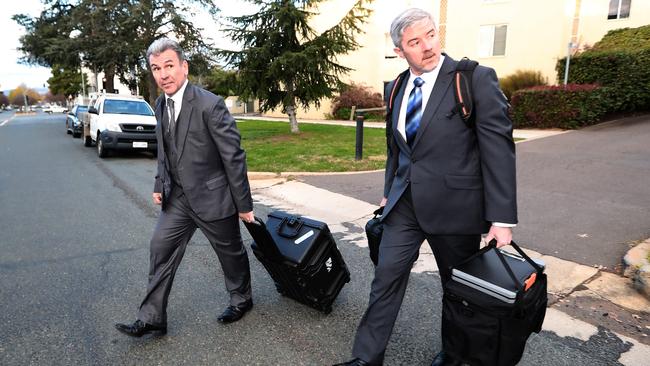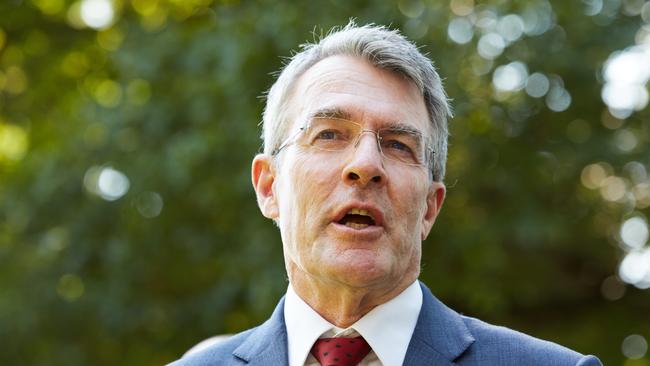Editorial: Journalists shouldn’t have to fear working in a free society
Armies and navies keep a nation’s border secure, police ensure it is safe to walk the streets and it’s an independent press that, without fear or favour, is able to hold authorities who govern a nation and ensure they don’t overstep their mark. But they did just that on Tuesday.
The role of the press in keeping a free society from sliding into authoritarianism cannot be overstated.
While armies and navies may keep a nation’s borders secure and police ensure it is safe to walk the streets, it is an independent press that, without fear or favour, is able to hold the authorities who govern a nation to account and ensure they do not overstep their mark.
On Tuesday, the Australian Federal Police did just that, raiding the home of Annika Smethurst, national political correspondent for The Sunday Telegraph, digging for information relating to a story she had published in News Corp newspapers back in 2018.

RELATED: Annika Smethurst raid was more than an invasion of privacy
The story was an important one, very much in the public interest. It revealed that the Defence Department and the Department of Home Affairs were considering plans that would make it far easier for spy agencies to keep tabs on domestic targets by secretly accessing their emails, bank accounts and text messages.
The change would have been a substantial departure from the accepted way of doing business, as it would have removed many of the safeguards against unwarranted spying on Australian citizens and would have made such surveillance possible with the approval of the Home Affairs and Defence ministers, both political appointees.
There is no doubt that the story was in the public interest, as it involved a potentially massive expansion of a host of government agencies to spy on Australian citizens.
Which is what makes it so galling that the authorities have targeted Ms Smethurst in what can only be seen as retaliation for bringing it to the public’s attention.

The fact is there are already far too many laws and provisions in force that criminalise journalists simply for doing their job.
This is particularly the case with various provisions in the Crimes Act and Commonwealth Criminal Code, including the Espionage and Foreign Interference Bill, which passed parliament in 2018.
This legislation criminalises people that “deal with” information, including even support staff who might open an envelope containing the material in question.
Add to this metadata laws, especially the so-called Journalist Information Warrant Scheme which enables law enforcement and national security agencies to use metadata to work backwards to find out the identity of journalists’ confidential sources, and it becomes increasingly difficult for those who are entrusted in free society with holding authorities to account to do their job.
None of this is acceptable. Journalists doing their job in a free society should never have to fear a knock on the door.
And it is one regret of the recent election that Australia has been deprived of the sensible views which shadow Attorney-General Mark Dreyfus might have brought to the portfolio, given his clearly far superior understanding of the issues at play.

Indeed it was Mr Dreyfus who, when proposed amendments to anti-treason laws were being debated, warned that the move was “clearly flawed” and that journalists could be thrown in jail for reporting in the public interest.
He is to be given credit for attempting to put the brakes on these amendments and for identifying significant flaws in their wording that could undermine public-interest reporting.
Sadly, Mr Dreyfus’ warnings were not heeded and exactly what he had predicted has come to pass, with a journalist’s home raided and phone, computer and papers seized.
This is simply unacceptable.
There is no other word for what is taking place here than intimidation. And it will have the effect — no doubt intended — of making some journalists think twice lest they, too, wind up in the same position.
It all adds up to the sort of behaviour that would not be out of place in a banana republic where journalists know they must only report the good news if they know what’s good for them.
Raids on journalists and the potential for criminal charges — which Ms Smethurst now faces — have no place in a free society like Australia.
Likewise, the heavy-handed behaviour of the government is proof positive of why strong protections for journalists are so necessary, lest authorities further crack down on those who might embarrass them with their reporting.
The Attorney-General must immediately call for this investigation to be stopped and, if the government is serious about press freedom and not using national security as a fig leaf, it must also introduce a class exemption for journalists who tell the public what they have every right to know.


